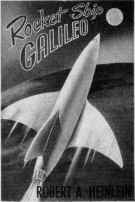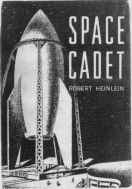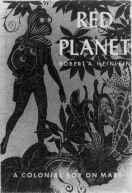Grumbles from the Grave (9 page)
Read Grumbles from the Grave Online
Authors: Robert A. Heinlein,Virginia Heinlein
Tags: #Authors; American - 20th century - Correspondence, #Correspondence, #Literary Collections, #Letters, #Heinlein; Robert A - Correspondence, #Science Fiction & Fantasy, #20th century, #Authors; American, #General, #Language Arts & Disciplines, #Science Fiction, #American, #Literary Criticism, #Science fiction - Authorship, #Biography & Autobiography, #Authorship

Editor's Note: Robert's ambition to write for higher paying and wider markets than pulp magazines caused him to look around for an agent who had good connections with other markets. For this purpose, he consulted L. Ron Hubbard, who introduced him to Lurton Blassingame.
Lurton had come to New York ambitious to write, but discovered that he could not make the grade. So he remained in the publishing center and became one of the most highly respected agents there. His brother, Wyatt Blassingame, sold regularly, if infrequently, to the
Saturday Evening Post
.
Robert became, eventually, Lurton's star client, but he was preoccupied with "world saving" after the atomic bombs were dropped. The articles he wrote did not sell. He then began the juvenile series of books with Scribner's—starting with
Rocket Ship Galileo (working title: Young Atomic Engineers). For some years, he wrote one juvenile per year.
The two men met on one of our trips to New York, and Robert urged Lurton to come to visit us in Colorado. Robert would accompany Lurton on a hunting trip, for elk and antelope and other game. I was asked to join them on fishing trips.
Although Robert neither hunted nor fished, he went on such trips with Lurton. During their trip to Gunnison, Colorado, where they went after elk, Robert "kept camp" while Lurton hunted through the mountains, along with a group of other hunters. Lurton bagged an enormous elk, and we were left with a freezer full of elk meat. It was my impression that Robert went along on such trips for Lurton's company.
Robert's next conquest, assisted by Lurton, was the
Saturday Evening Post
, with "The Green Hills of Earth," followed by three other stories for that magazine.
The friendship flourished, despite Robert's distaste for doing business with friends. It lasted until Lurton in the late 1970s, thinking of retirement, took on some younger associates. Robert's books are still handled by the Blassingame-Spectrum Agency in New York.
November 12, 1946: Robert A. Heinlein to Lurton Blassingame
. . . and I shall get back to work, probably on a story called "It's Great to Be Back!" A couple living in Luna City are about to return to Earth, their contracts completed after three years. They have been homesick the whole time and are always talking about it. They return to Earth and discover that they had forgotten the disadvantages of living on Earth—uncontrolled weather, dirt, colds-in-the-head, provincial attitudes, stupid and ignorant people (the residents of Luna City are of course exceptionally intelligent and civilized because of selection for those qualities—only persons of high IQs and social compatibility would pay the cost of sending them to the Moon and keeping them there), etc., etc. At the end of the story they are more homesick than ever—for Luna City!—and are straining a gut to get back there. The story will be used also to give a picture of Luna City and the conditions of life on the Moon, social and economic, for background and color.
Editor's Note: Between 1947 and 1949, at least ten of Robert A. Heinlein's "slicks" were published; four appeared in the
Post
and two in
Argosy
. This was a remarkable achievement, but it was soon eclipsed by the success of his juvenile novels.
ROCKET SHIP GALILEO

(42)
Rocket Ship Galileo,
in 1947, was Heinlein's entrance to the "big-name" publisher, Scribner's.
Ross, Art, and Morrie plan to start college in the fall, but meantime they are experimenting with model rockets. Then Art's uncle, atomic engineer and Nobel Laureate, Dr. Cargraves, seeing the quality of their work, offers them a chance to work with him. He's going to build the first rocket ship to the moon, atomic powered!
They are soon at work in an abandoned testing site, adapting an old commercial freight rocket, sold at scrap prices, for the new power. And soon they are able to take off and make their landing on the moon. But then their ship is suddenly bombed by another craft. They have landed within a few miles of a base of unreconstructed Nazis, who plan to still win the war by bombing Earth from the moon!
Overcoming the Nazis and getting their ship is quite a problem!
February 19, 1946: Robert A. Heinlein to Lurton Blassingame
I am going to write the juvenile outlined in my last [letter], starting two days hence. You will receive takes and a synopsis, and the finished manuscript should be in your hands about 15 March. [Two friends] convinced me that my own propaganda purposes will be served best by writing a series of boys' books in addition to the adult items previously described. I have purchased several of the popular boys' series novels and feel confident that I can produce salable copy—copy which can be sold to one of these markets: Westminster, Grosset and Dunlap, Crown, or Random House.
March 16, 1946: Robert A. Heinlein to Lurton Blassingame
I think his [the editor who turned down
Young Atomic Engineers
] conception of a story of the atomic era is inappropriate. We have entered a period of extreme change. I see two major possibilities—either a disastrous atomic war which will destroy for a long time the present technological structure, followed by a renaissance, the nature of which I am unable to predict, or a period of peace in which technical progress will be so enormously accelerated that only short range predictions can hope to be reasonably accurate.
Young Atomic Engineers
[
Rocket Ship Galileo
] is based on the latter of the two assumptions, i.e., a period of peace and unchecked technical progress.
* * *
In doing fiction about the future, I regard myself as a professional prophet—a man who makes an honest attempt to evaluate the probabilities and to write stories setting forth patterns inherent in those probabilities. If I am to be honest, I must prophesy what
I
think will (or could) happen, not what someone else thinks will happen. If Mr. ---- does not see my concept of the possibilities, he had better write it himself or get a hack writer who is willing to write another man's plot. That should be easy for him to do and I do not disapprove of such hack work—but it is almost impossible for me to do it, and I won't do it unless I'm hungry, which I'm not.
(
Young Atomic Engineers
contains two conventional deviations from what I believe to be reasonably possible; I have condensed the preparation time for the trip and I have assumed that four people can do work which should require more nearly forty. Otherwise, I regard the techniques used in the story, and even the incidents, to be possible, albeit romantic and in some respects not too likely in detail. But I
do
expect space travel and I expect it soon. The counterplot is more than a possibility, it is a distinct menace—though it may not turn out to hinge on a base located on the Moon.)
. . . I suppose you are used to the method of having a writer send in a few chapters and a synopsis. I will do that when requested to, but, unfortunately, once I have gone that far with a novel, that novel will be finished about ten days later, or at least with such speed that only the fastest possible response from the publisher can affect the outcome very much. I am sorry, but it is a concomitant of how I work. I work slowly on a novel for the first few chapters only. As soon as I can hear the characters talk, it then becomes a race to see whether I put down their actions fast enough not to miss any of them. It is more economical in time and money and it results in a better story for me to work straight through to a conclusion, rather than wait for an editor to make up his mind whether or not he likes it. Editors are not likely to like my advance synopses in any case, for it is simply impossible for me to give the flavor of a story not yet written in a synopsis.
[(The additional books proposed for this series are:
The Young Atomic Engineers on Mars,
or
Secret of the Moon Corridors
,
The Young Atomic Engineers in the Asteroids
, or
The Mystery of the Broken Planet
,
The Young Atomic Engineers in Business
, or
The Solar System Mining Corporation
And at least two more.)]
* * *
Editor's Note: September 24, 1946. Letter of this date says that editor at Scribner's liked
Young Atomic Engineers.
September 27, 1946: Robert A. Heinlein to Lurton Blassingame
Young Atomic Engineers
—I am delighted to hear that Alice Dalgliesh [editor at Scribner's] likes this ms. In my letter of 16 March 46 you will find a list of titles for a proposed series of sequels and considerable discussion of what I would like to do in re juveniles, as well as what I think might be done further to exploit this story. I expect to be guided by you in all those matters—my opinions are not final. I certainly would be willing to rewrite to editorial order and to plan stories to fit editorial desires in order to have my book brought out by so distinguished a house as Scribner's.
February 1, 1947: Robert A. Heinlein to Lurton Blassingame
I have signed the contract as you advised, but I am returning the contract to Scribner's through you in order that you may reconsider whether or not to ask them to make any changes in the contract . . . The manuscript has been revised and is now being retyped. It will be delivered to Scribner's by the tenth of February.
SPACE CADET

(45)
Space Cadet
, Scribner's, 1950. Cover art by Clifford N. Geary.
The training of cadets for the Interplanetary Patrol takes place in Colorado, in space, and on actual patrol. Following some violent physical tests to see whether an aspirant is able to undergo the rigorous environment of space, the cadets go to training in the school ship.
They learn how to handle themselves in free fall in addition to the required academic subjects. Senior cadets take the younger ones in hand to teach them the traditions of the Patrol.
As a part of their training, they go as very junior officers on a patrol ship, and Matt and Tex run into an adventure in Venus jungles . . .
* * *
July 18, 1947: Robert A. Heinlein to Lurton Blassingame
Miss Dalgliesh and I agree with you on
Space Cadet,
but I won't write it until later this year.
February 17, 1948: Lurton Blassingame to Robert A. Heinlein
No danger of Scribner's turning down
Space Cadet.
August 1, 1949: Robert A. Heinlein to Lurton Blassingame
There is a correction to be made in
Space Cadet,
which I have already given Scribner's for the second edition; it occurs to me that it should be made in the Norwegian, Italian, and Dutch editions. Will you relay it for me? It is quite simple: on the very last page there is a line of dialog: "Never lead with your left." It should, of course, read, "Never lead with your right."
Editor's Note: This mistake resulted from the manuscript's having been read by me, Lurton (who was left-handed), and several editors at Scribner's (none of us knew anything about boxing).
January 5, 1951: Robert A. Heinlein to Lurton Blassingame
I have written Miss Dalgliesh about the TV scripts [
Tom Corbett, Space Cadet.
] Did you read them? If so, you know how bad they are; I don't want an air credit on that show (much as I appreciate the royalty checks!) and I am reasonably sure that a staid, dignified house like Scribner's will feel the same way. It has the high moral standards of soap opera.
RED PLANET
